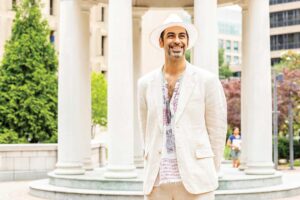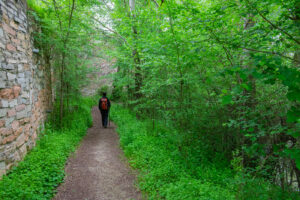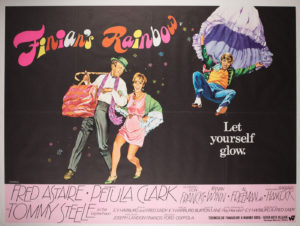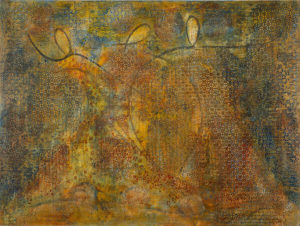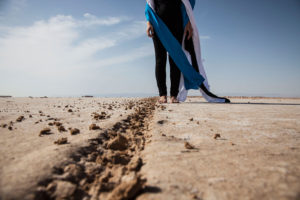Rewa Zeinati presents poetry at a Sukoon event at The Mansion in Beirut (Photo courtesy Rewa Zeinati)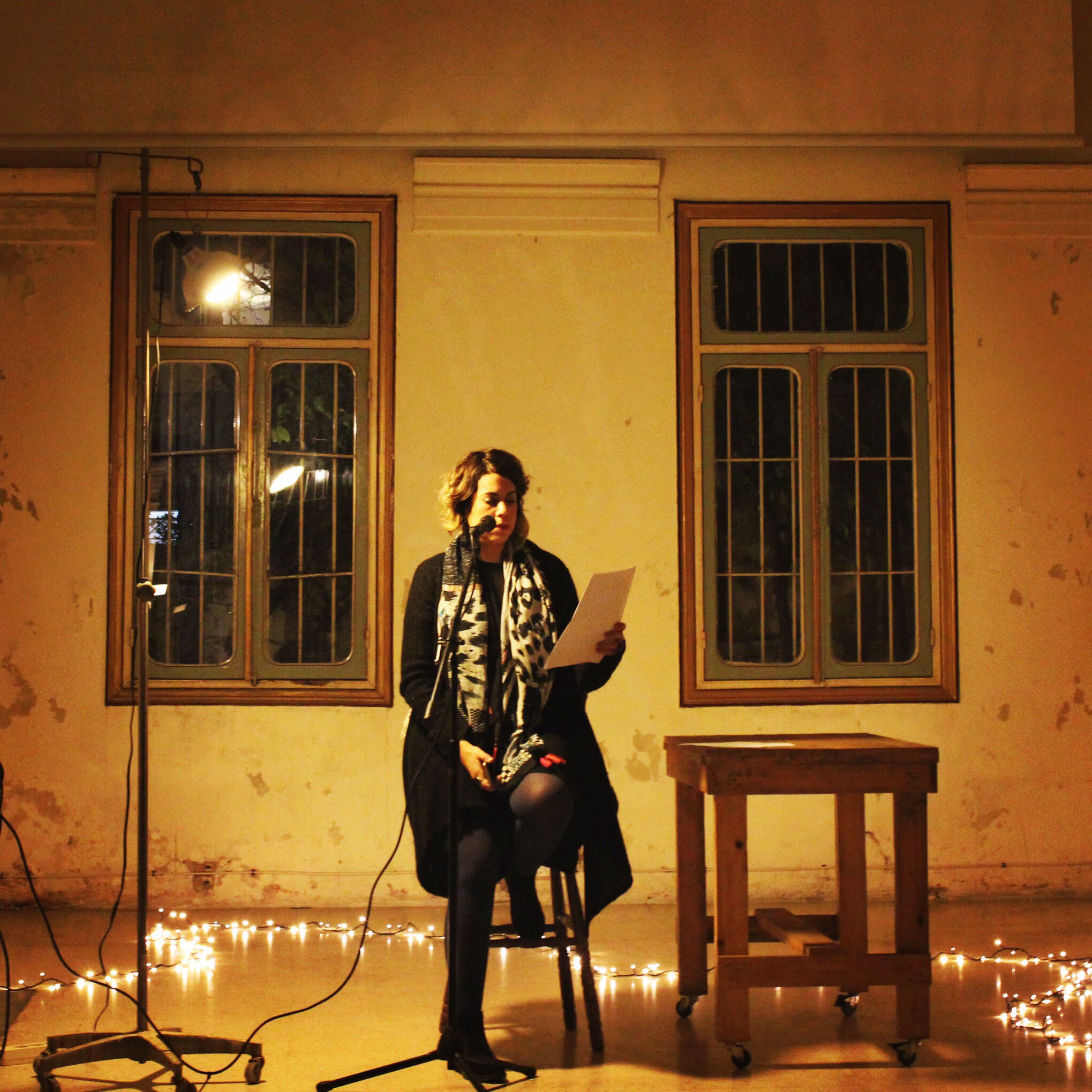 <
<
This essay was inspired by the original script for a Tedx Talk given at Phoenicia University in Lebanon entitled “Unset Your Mindset: Experiment, Explore, Excel”.
Rewa Zeinati
“Tell me, what is it you plan to do with your one wild and precious life?” goes a line from a gorgeous poem by American poet Mary Oliver. A line that can be interpreted in multiple ways depending on how you see the world. Speaking of poetry and writing, my partner once asked me, if I were forced to choose between him and writing, which one would I choose?
Before I got the chance to answer, he told me that he already knew what I was going to say. Of course, I didn’t disappoint him. I said that I would choose writing over him. And so he asked for a divorce and that was the end of it.
Of course I joke. What really happened was that he nodded and smiled at my expected response. The point is, he understood that writing, to me, was something that I could not live without. He understood that it was so a part of who I was, who I am, that not writing would be like I was choosing, consciously choosing, to go against my nature. He also understood, and he told me this, that I was lucky to have found my calling—most people didn’t or don’t, and they end up in places and choices which, for the most part, they had little to do with.
It was not always the case though. What I mean to say is, it was not always the case that I always knew that I wanted to be a writer. To me, it wasn’t a realistic option while I was growing up.
Other people did that. Other people published books and poetry, other people wrote plays and acted in them, or composed music and albums and fashion labels and art. Other people came up with ideas and organized events and created things.
I was merely the recipient, or a mediator of sorts.
Hamra Street art, Beirut (Photo courtesy Rewa Zeinati)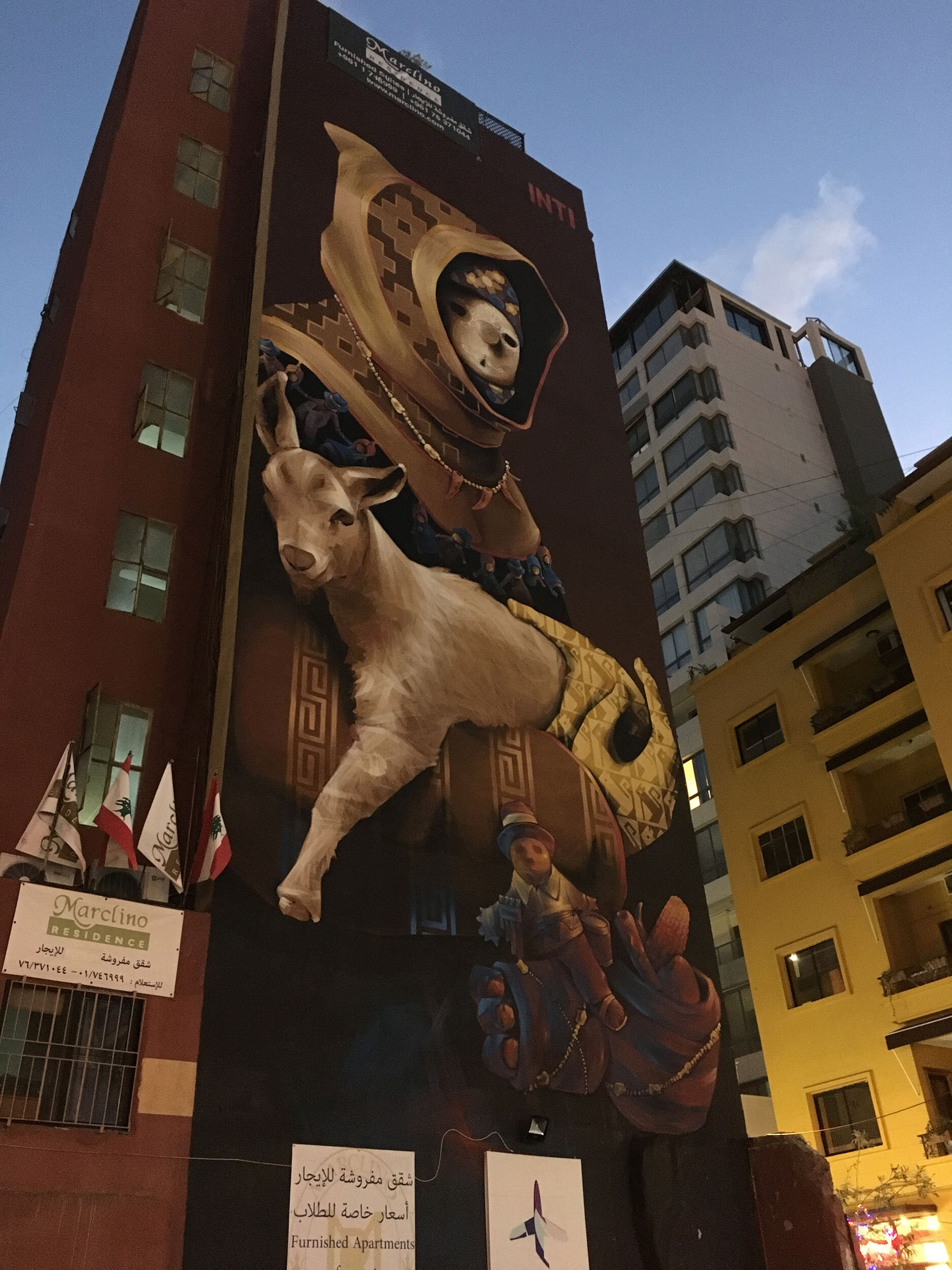 <
<
I was able to discover this passion, or calling if you will, as an adult, only in the past decade and a half, thanks to several experiences along the way.
Experiences that, had I resisted, I would not be the person I am today. Experiences, which I allowed to take me by the hand, and lead me into the heaviest fog, into another kind of future, or three.
What I had originally planned to do was teach English to high school students, with my undergrad degree in English Literature, and postgraduate teaching diploma. This was my life path, I safely thought at the time. A path my parents figured was good for me, as a woman, in general, and as an Arab woman, to be more specific.
My mother, a biology teacher herself, always believed schoolteachers had the best vacation opportunities—they took off during the school year holidays and had the whole summer to themselves, to spend with their families, as wives and mothers. Thank you king patriarchy, for the perfectly assigned roles preconceived for each gender, with a whole set of expectations, or in other words, in my mind, limitations.
But not to get too detailed, I did teach English to high school students in schools in Lebanon. But then life took me to other countries and other places. And the key thing, in retrospect, was that I did not resist.
Life took me to the United States of Amreeka, for instance, where I lived in Iowa City for a while. But I still held on to the safe plan and ambition of teaching English; this time at American schools. Never mind the irony that one friend pointed out when he joked, “You mean, you, an Arab, are going to teach English to people whose first language is English?”
But it didn’t work out quite the way I had in mind because I soon found out that, because I was foreign-educated, there were rules, regulations and requirements that I needed to consider in order to be certified to teach in the US.
So during the time that I was supposedly seeking to be certified as a valid teacher, I worked in various other fields; jobs that I’d never considered doing but I did them anyway.
For example, I folded clothes as a Sales Associate, and practiced my smile, especially with despicable customers. I have to say I now appreciate what it takes to do this job and try as much as possible not to be that despicable customer myself. And during my job in retail I had my bag investigated for stolen items each time I checked out at the end of my shift. It was standard procedure and every sales associate went through the same ordeal so I shouldn’t have taken it personally. But I did. I couldn’t help it. Maybe I’m small-minded but I couldn’t help feeling offended and hurt by this so-called “standard procedure.”
I folded bras and underwear at a famous American lingerie outlet that turned women into angels. Enough said. That lasted about two days before I said thanks, but no thanks. I also worked as a bookseller at a major American bookstore. I loved every minute of that, surrounded by books and people who loved books and reading as much as I knew I did. Somehow no one checked my bag at the end of my shift there, because, really, who would steal a book in America’s hyper-consumerist culture?
But all the while I wrote long emails home to family and friends, about my experiences abroad. Long intricate, carefully constructed emails about the details of my life in that Midwestern setting; I wrote about my longing for my homeland, and I wrote about my perception of the world around me as a foreigner, as a woman, as a post 9/11 immigrant in the US. And with time I began to receive comments from family and friends and friends of friends whom I’d never met, who’d somehow received my emails, about how much they enjoyed the stories and looked forward to receiving more.
Halabi Bookstore in Beirut (Photo courtesy Rewa Zeinati)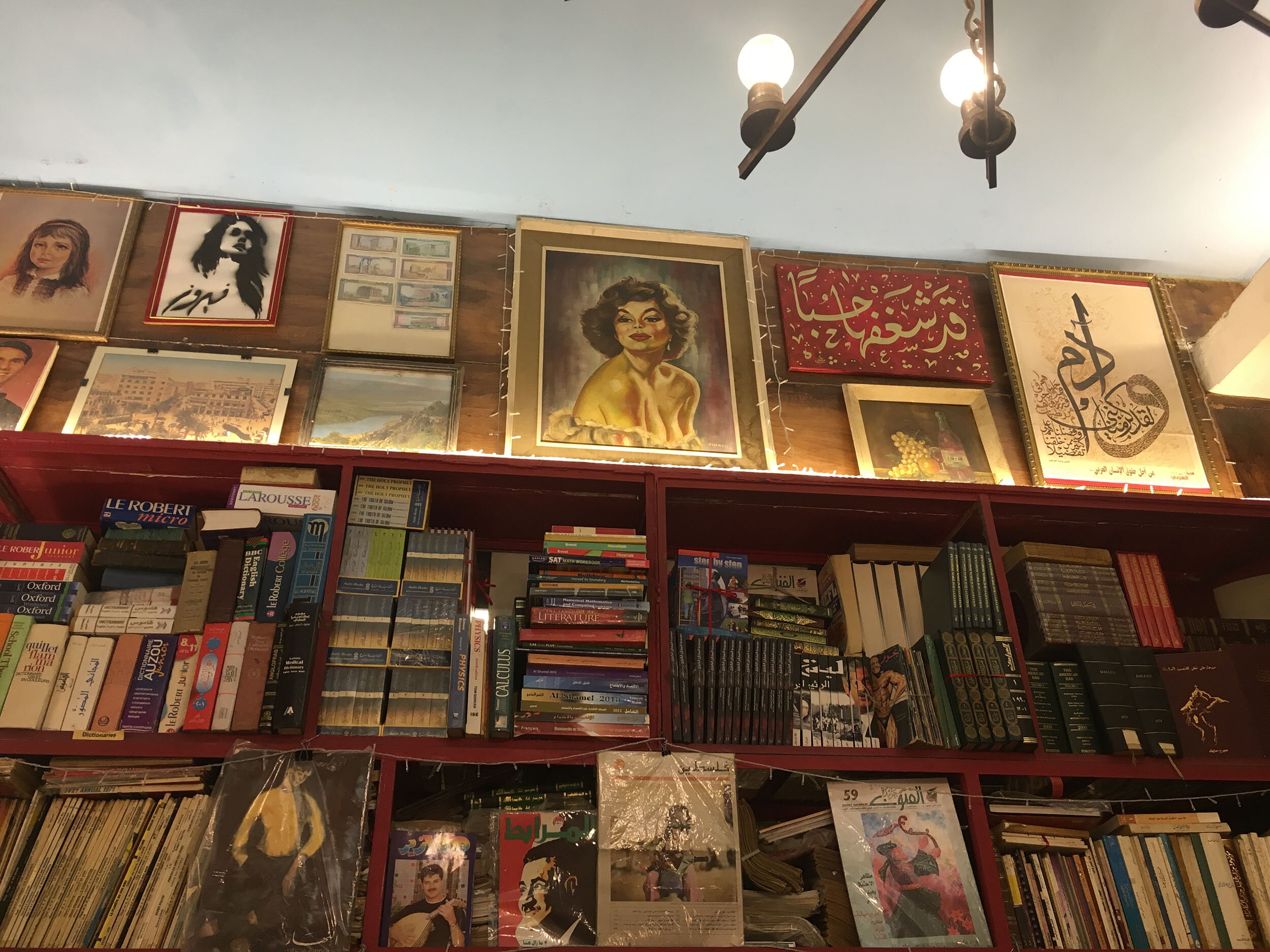 <
<
With time it became more and more obvious that people, other than my mother, actually wanted to read my crap. And I began to realize that I enjoyed nothing more than composing those letters back home and I began to realize that this is probably what I wanted to do with the rest of my time. To just write. And read of course. And it was one of the scariest thoughts I’d ever had. Because this was not part of the plan of becoming a high school English teacher.
But I took that scary thought and I went with it to apply for a Masters degree in creative writing at one of the top universities in the nation. But when I asked about the application process I learned that I needed to be published first.
That’s when it struck me.
Seriously? Me? Published? As in I do the work and someone likes it enough to make it public on beautifully bound sheets of paper? To me it felt impossible.
But I kept at it. I kept at the writing. And after a while, a few years and various jobs later, I reapplied for a Master’s degree in Creative Writing at other universities and got accepted into UMSL – University of Missouri, in Saint Louis.
That’s when a whole new world opened up around me.
My being the only Arab in the whole English department was irrelevant. I was sitting in a space where people loved and appreciated words and writing as much as I did. And it was a natural expectation to produce work that had the potential of being published.
That’s also where I became familiar with literary and poetry magazines and literary and poetry readings, where people would stand up in front of an audience and read or perform their work, while no one in the room thought this was a silly waste of everybody’s time.
I felt at home.
Not only was it not a complete waste of everyone’s time but I realized that people, including myself, felt something there.
Words mattered, I began to understand. Words could change people, minds, perceptions, life paths. It was a powerful tool. I knew how much it changed me as a lover of books and reading, but I never thought that I would one day be a producer of possible books and reading myself.
So I kept at my writing, and I began to send out my work to be published, and I got a zillion rejection letters before I began to get a glimpse of publication.
I still remember the feeling of having my very first poem published in a magazine, years ago. It was a tiny poem about Lebanon entitled “Sister.” I don’t think I’ve ever been more shocked at myself, or more amazed at the idea that I produced this work; I was no longer merely a passive recipient. I was ‘other people.’
But during my time in the US, I was not only a potential thief, remember the sales associate protocol? I was also someone whose voice would easily be muffled or dismissed. I don’t mean my literal voice, what I mean is the voice that represented me.
Very few people whom I met at work or at school were aware where Lebanon was located on the map. Very few seemed to care where I was really from, and when I eventually got naturalized as an American citizen, I was told on more than one occasion, in various work or play settings, to no longer say that I was Lebanese. I was expected to suddenly become fully American.
It didn’t sit well with me. All of a sudden, without warning or clarification, I was supposed to be an American. Even though America was in my head and heart from a very young age, through music, film, literature, fashion, academics; i.e. imperialism, I wasn’t yet sure what being an American actually meant. So I wouldn’t have it, and at that point I decided to take my voice back, even in the smallest of ways.
So for instance, during my Master’s program, my writing did not include characters whose names were Jack and Jennifer and Donald. (Definitely not Donald.)
They included common Arabic names like Layla, Salma, Ziad. They included flavors from my kitchen, the weather in Beirut, street names and jargon from my ancestors. They included things that I cared about, socially and politically and intimately. And ironically the more I did this, the more I felt like I belonged. And Saint Louis began to feel like a second home to me.
Another example was when I began to participate in poetry events and readings, and I began to share my work, my voice. And with time, during those readings, I would have people come up to me after the event, and talk to me about my words, which indicated all that I knew of my home, my angst from a distance, my wars, in other words, my lens, only to tell me how it made them think about their lives, their privileges, their distance, in other words, their somewhat partial lens.
So this was all good and well. But I have to admit something. All the while that I was living in the US, and had discovered my passion for writing, I felt that something was missing; something related to my identity as an Arab Anglophone writer. I felt that the journals that I became familiar with in the West and had work published in, were mostly run by older white men, or white men in general, or white women, or people of color, but who were based in the West. Nothing that represented me, as an Arab Anglophone writer, not necessarily an Arab American writer, was produced in the Arab “world” by an Arab-speaking person, and so one morning over coffee and a cigarette, I thought, why don’t I do it myself?
Why don’t I start something that I feel would fill a gap in the Anglophone literary narrative?
The idea was born a while before I actually made it happen, as is the natural case with a lot of ideas. Fear and self-doubt have a lot to with the delay.
But then finally, when I moved closer to home, to a city called Dubai, to be more specific, I made it happen. Thanks to technology and WordPress and a little bit of perseverance and common sense, and some years of experience with people and places and jobs and university editing boards, and various negative opinions that I chose to ignore, I founded Sukoon, an Arab-themed art and literature magazine, published in English.
And I’ve been so grateful to have received so much positive feedback and interest from writers and readers, supporting me for starting this magazine, for filling up a much-needed gap, for highlighting marginalized voices in a scarred and underrepresented region. You can’t put a price tag on that kind of thing.
And later on, I also had a couple of unexpected experiences while living in Dubai. My nonfiction collection was picked up by a publisher and my poetry manuscript was also accepted for as a chapbook by another. Whole books, my words, out there in the universe. I felt nauseous and incredible all at once.
So, in a nutshell, I moved from my set plan of being a high school teacher to my discovery of becoming a published poet, writer, creative copywriter, editor, organizer of literary events, and university instructor.
I learned so much about myself as a writer and as a person from each and every turn of experiences and events that came my way. From every city and country I was either forced, or chose, to live in.
I don’t think we realize how vital it is to step into unknown territory, to always keep our minds and eyes open to what unexpectedly comes our way. We won’t know what we’re capable of, or what we truly care about, if we don’t allow ourselves to let go of rigid systems about ourselves first. Systems that we inherit, systems we believe, with or without, our permission.
Even my teaching opportunity came unplanned, coincidentally around the same time that I was moving back to Lebanon after being away for years and years. University students are probably the most terrifying bunch of humans you can meet. But when the chance turned up, I was open to it, and those terr
ifying bunch of critics quickly became friends and collaborators.
Beirut revolution NOW, free your mind, kill your TV (Photo courtesy Rewa Zeinati)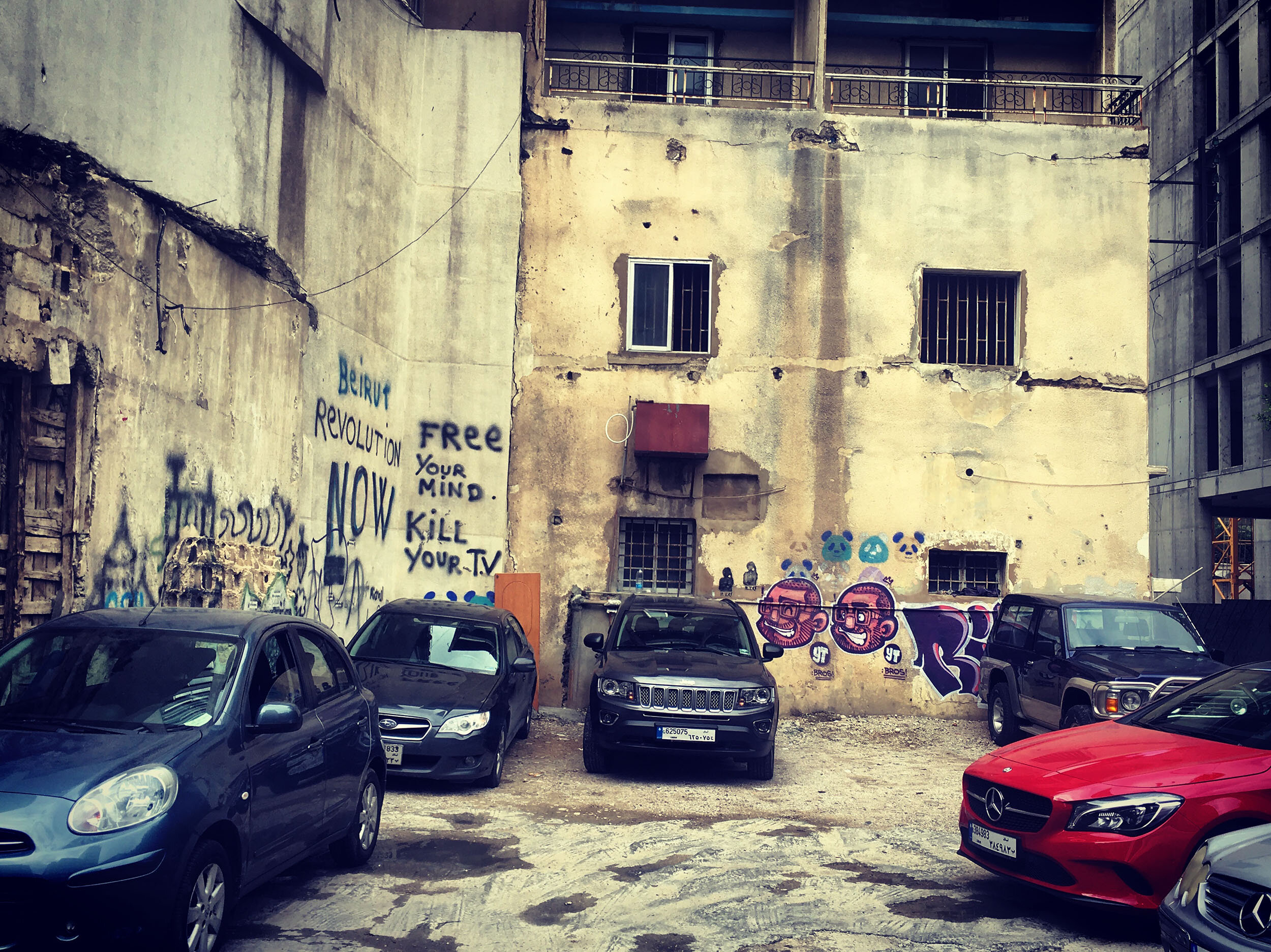 <
<
But my journey didn’t stop there. And I had no say in it except to buy a ticket and leave with nothing but my winter clothes and laptop. And I am painfully aware of the privilege, as Lebanon increasingly became one continuous heartbreak for which I no longer have the words. I thought I didn’t before but now it’s a whole other kind of mourning I never knew I could feel.
Today I build a new life in Dearborn, Michigan, where I’m told all the Bint Jbeil Lebanese are. And I’m told, by the Lebanese, to be wary of the Lebanese. And I am not from Bint Jbeil and it is extremely irrelevant anyway and that’s a whole other kind of racism we create amongst ourselves. And speaking of racism, a new president of the United States of Amreeka was just elected and I am looking out the window at the gorgeous Michigan fall as I wonder about my two-year-old life here. How many times can one start over, how many times can one be an immigrant or an expat in a single lifetime?
When you’re from the countries I come from, you don’t plan your “one wild and precious life.” You just live it. And consider yourself lucky. And when it’s not working anymore, you pick up and go. And you keep going, if you have that kind of advantage. And then you write about it and you write some more and you find the others who care about the things you do. You always find the others. If they don’t find you first.
<



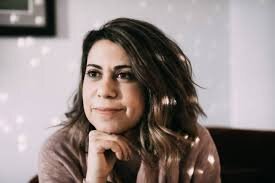






![Ali Cherri’s show at Marseille’s [mac] Is Watching You](https://themarkaz.org/wp-content/uploads/2025/09/Ali-Cherri-22Les-Veilleurs22-at-the-mac-Musee-dart-contemporain-de-Marseille-photo-Gregoire-Edouard-Ville-de-Marseille-300x200.jpg)

